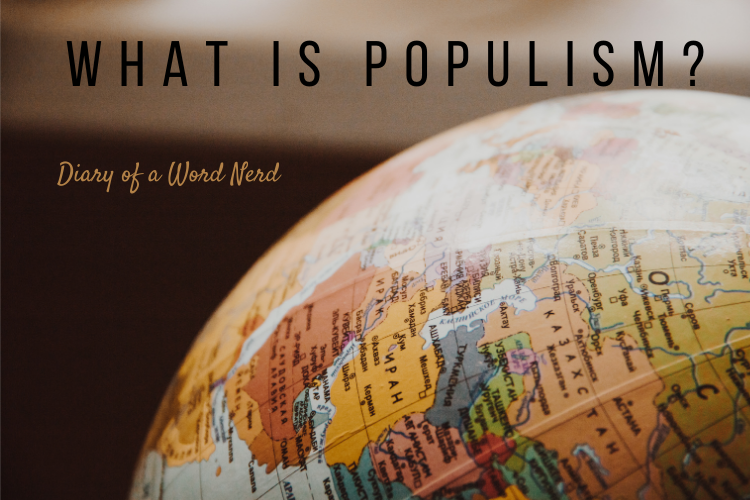If I gave you two minutes to explain populism, what would you say?
Yeah, up until this week, I didn’t understand populism either. I’m no political science expert, but after reading about the subject, I have better understanding of populism and the controversy around it. To follow up on my post about the power of words, I’d like to try and explain this charged and complicated word.
A vague term
Populism first showed up in America in the late 1800s, when people frustrated with Big Business and the government formed the Populist Party. Its platform called for more economic regulations, nationalized railroads, and directly elected senators. The party had some success, but never cracked our two party system, and “populism” remained largely a term discussed by academics.
Starting in 2016, “populism” gained popularity as the media claimed that Brexit, the 2016 U.S. Presidential Election, and Viktor Obrbans’ takeover of Hungary showed a rise in worldwide populism. However, even though we are hearing the word more, it usually doesn’t come with a definition, so we are left with a vague term often used to evoke negative feelings.
Populism is frequently associated with charismatic politicians who appeal to the resentment of the “common man” and make promises to end their struggle. Mainstream media and politicians apply the term to political movements that don’t fit the mainstream. Populist leaders are characterized as using highly emotional and simplistic rhetoric and backing opportunistic policies to win support of voters. But couldn’t this last sentence apply to many politicians? And therein lies the problem of using a broad term.
Trying to define populism
In 2004, Dutch political scientist Cas Mudde published “The Populist Zeitgeist”, a paper explaining the two core values of populism. 1) Society exists in a tense, moral division between “the people” (who are good) and “the elite” (who are corrupt and out of touch). 2) Politics should represent the “general will” of the people, a common sense set of ideals shared by “ordinary people.”
This definition, used widely by journalists, is often referred to as the “thin ideology definition” because it rests on those two basic tenets. Mudde asserts that populism, because it is a thin ideology, often partners with another ideology to give it more depth. This explains why politicians as vastly different as Donald Trump and Bernie Sanders can both be considered populist. Each could be said to champion the will of “the people” over the self-serving “establishment. “
Different forms of populism dictate who belongs in the morally divided groups. “The people” can be made up of anything from an ethnic group feeling threatened or people facing economic hardship. For example, in right wing populism, “the people” are often those who resent an underclass and the elites who favor that underclass with policies to keep power away from “real people.”
However, some academics see populism as a political style, not a value based ideology. They argue that conflict is inherent in political life, and there will always be a “we” and a “they”. In democracy, the status quo shifts as people unite to create change. What we should expect as normal fluctuation often looks like populism, and therefore characterizing populism as negative can stifle the normal democratic process. Populism often raises valid questions about the status quo, but since many recent successful populist movements have come from the far right, populism has gotten a bad name.
Misconceptions about populism
Some common misconceptions about populism include:
- any politician citing “the will of the people” is populist
- populism and nationalism/ nativism (policies advocating ethnic purity) are always linked
- anyone who deviates from the mainstream is populist
Why populism exists
Many who study politics believe that populism exists because reality doesn’t match the shining ideals of a government built by and for the people. As political parties have converged in recent years, there is a smaller range of options for representation, and people cannot identify with the people making policy decisions. Says Peter C. Baker in his article “We the people: the battle to define populism”,
It finds life in the cracks – or more lately, the chasms – between democracy’s promises and the impossibility of their full, permanent realisation.
Sounds to me like populism, as an ideology or a political style, will be around for a while. We should probably try to understand what it is and why its here.
If you’d like to learn more about populism, please check out these articles:
- “Populism Is Meaningless: By reducing the term to a political pejorative, we risk rendering it worthless,” The Atlantic, by Yasmeen Serhan
- “We the people: the battle to define populism”, The Guardian, Peter C. Baker
What is your understanding of populism? Are there other political terms you would like to learn more about?
Thanks for getting nerdy with me!



